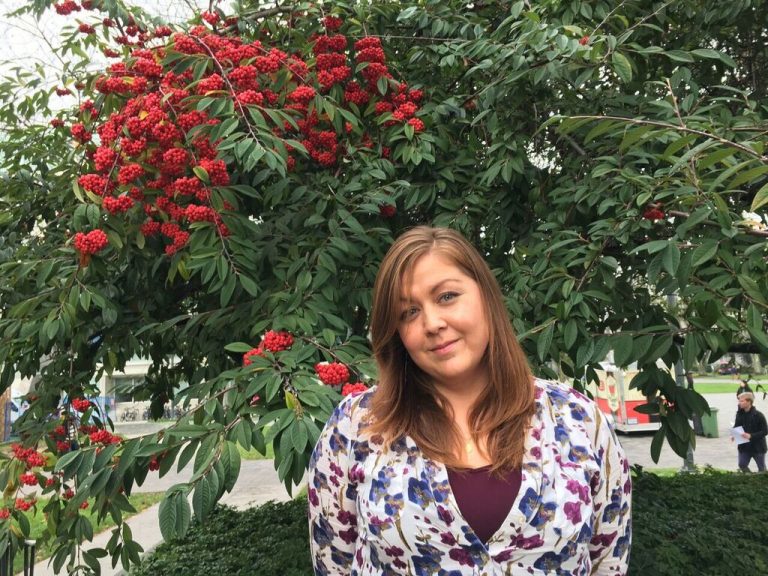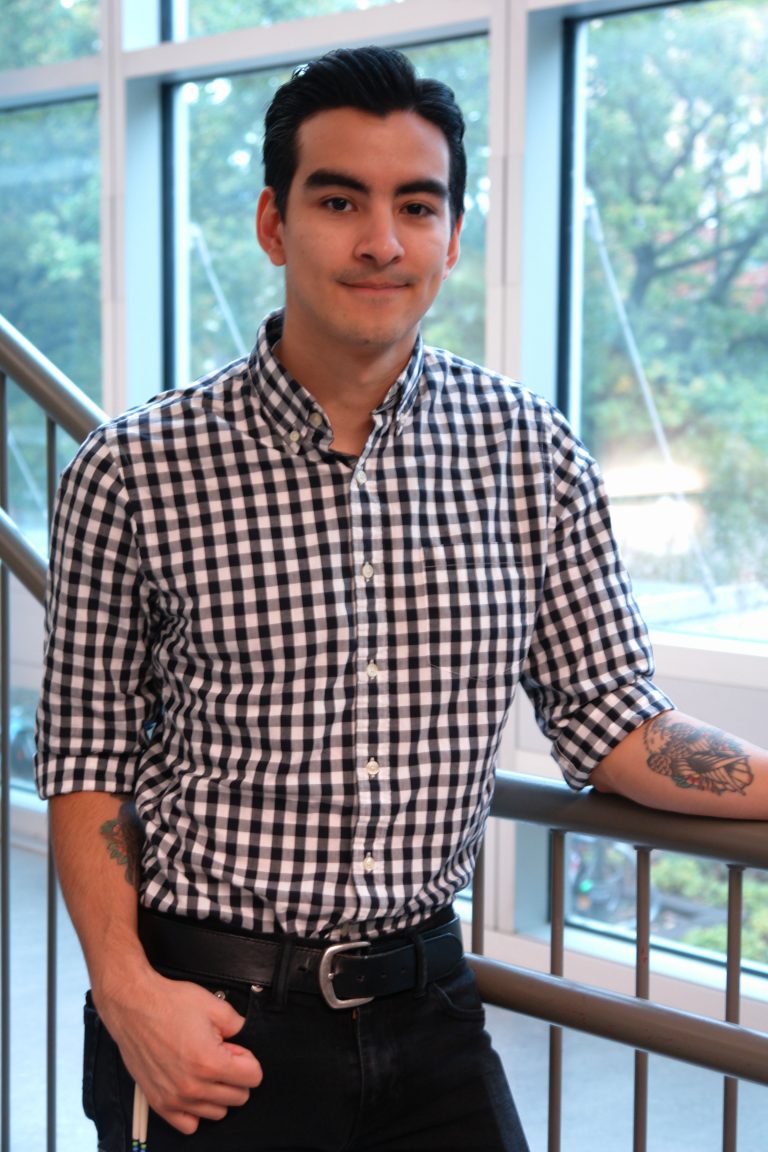Since we launched the project to include Musqueam history as a prominent aspect of the online resource Time and Place at UBC last summer, we were blessed by the opportunities to work with two UBC students of Musqueam descent – Sara Louie and Mathew Andreatta.
Sara assisted with the archival research and documentation of Musqueam events to be featured on the timeline. Mathew assisted with the development of an educator guide that will accompany the new timeline. Both Sara and Mathew completed their work for this project, and they graduated from UBC this summer (Congrats to both!). Before they move on to a new chapter of their lives, we interviewed them to hear about their experiences with the project.
Interview with Sara Louie

Tell us a little about yourself
My name is Sara Violet Louie, I am χʷməθkʷəy̓əm, a Musqueam First Nations member, located here in Vancouver, BC. I recently finished my Bachelor of Education Degree at the University of British Columbia (UBC). I have been taught and continue to learn traditional teachings from many of my community members and respected late elders, and thankful to my mom who continues to teach me these important aspects of our culture. I am still learning the hən̓q̓əmin̓əm̓ language, and one day I aim to be able to teach the language contributing to the revitalization of hən̓q̓əmin̓əm̓. I am truly grateful for the Native Indigenous Teacher Education Program (NITEP) that has given me the opportunity to be a part of the changes that are going to happen within education in BC.
I am a proud and resilient person: I am proud but humble in my experiences. I am resilient despite challenges I have faced and that our community faces with the intergenerational effects of residential schools. I see that all these challenges have really shaped who I am today. I am passionate about equity in education, empathetic for all students, and determined to make positive changes in my community.
What drew you to the project
As a Musqueam community member and an academic, I honestly wanted to contribute to something that will be very resourceful to UBC and educators. I was very interested in learning about Musqueam history, and I thought that this project would give me a chance to dig into our archives and learn more about the history. I was particularly attracted to a chance to connect Musqueam presence to the historical trajectory of UBC on Musqueam territory because I thought that it would give us as Indigenous people an opportunity to place our history unbiased from others and in a meaningful and resourceful way. Many educators don’t even know where to start when teaching about our local Indigenous history, and I thought the timeline could serve as a reliable source of information that allows people not only to locate Musqueam histories but also to validate our presence for thousands of years long before colonization.
What did you find most meaningful in your work with this project?
It was an honor to work on this project giving Musqueam a real voice in our Canadian history. I really enjoyed the research that I participated in on this project and learning about the stories of our elders and what they had done to protect our rights. The content that was added to the timeline are all truth of our history and from the perspective of our own people, that is what really struck me as an important part of this project. The project provided me the opportunity to see and feel how crucial it is that Indigenous people are given the opportunity to be a part of writing, publishing, and providing factual events of history.
If you could choose one thing, what is it that you would like people at UBC to know about the histories of the land where UBC is located – the traditional, ancestral, and unceded territory of the Musqueam people?
The part of the UBC campus near the Museum of Anthropology used to be a lookout point for our community to protect us from others whether it was other First Nations canoeing down the river or explorers entering the territory. A runner would keep watching, and if they saw anyone coming, he or she would run the 10km+ to the village to warn the community. One of these runners was an ancestor of mine, which I only learned through other collaborative projects like “the city before the city” c̓əsnaʔəm project. When Indigenous people have opportunities to learn and share about their own histories, I believe that would also benefit others on these Indigenous people’s lands, as long as they are willing to take the time to learn. All of those people who try to learn would find something valuable to learn, such as culture, language, and people; and most importantly, through such learning, we can build meaningful relationships together.
Tell us about your plans or wishes for the future.
I hope to find a teaching opportunity in Vancouver or the Lower Mainland that will enrich all students to be inspired to learn about local First Nations histories. I would like to create curriculum content in various units that have Musqueam’s culture, language and history embedded into the various subjects for the elementary level. Often teachers find teaching about First Nations discouraging as many haven’t been taught our true history, and I would like to help them see how to include local Indigenous history in the classroom and find their own creative ways. If more teachers try to teach about local Indigenous histories from the heart, I believe we make the first step toward educating all Canadian children about the truth of Canadian history.
Interview with Mathew Andreatta

Time and Place Student Assistant Mathew Andreatta
[Please click here for Mathew’s previous blog posts including his introduction interview.]
What was your most meaningful experience in this project?
This is truly a hard question to answer as there have been so many. From working with community members at Musqueam to running my own workshop at CTLT for the first time, I’m not sure if I can pinpoint one singular experience. A very meaningful task for me was in fact going through the historical moments of the timeline, categorizing them by themes, and forming a narrative for each theme. I tried to allow these moments to both stand on their own as well as together to demonstrate their overarching stories and how they affect one another. This research allowed me to take on a deeper understanding of my community and connect with our stories in ways I had never been able to before taking this position on.
I am very grateful for the opportunity and growth and connections this project has allowed me to make. In particular, I would like to thank Hanae Tsukada for this amazing chance to collaborate on this project and for always listening and guiding my voice throughout the process. This project has allowed me the space and opportunity to connect more deeply with my identity as an Indigenous person and given me amazing insight and understanding into Musqueam histories and contemporary significant moments. The relationships that have been fostered here will stretch far beyond this project and hopefully allow for more space of collaboration between UBC and other Indigenous communities who wish for their stories and histories to be shared and handled in respectful and meaningful ways as Hanae and I have worked so hard to do.
What did you find most challenging in this project?
I believe the sheer amount of information Hanae and I were having to review and try to form into cohesive narratives while also ensuring the protection of Musqueam’s histories and ways of being all at the same time provided us with the biggest challenges. However, I feel that these challenges turned out to be the most fulfilling experience for me as I felt we were taking the time to discuss, understand and enact ideologies and practices of reconciliation. Locating Musqueam in the front and centre of both the process and product of the project is a necessary responsibility that must be actively put into practice if we as a community and a university are to take any notion of reconciliation seriously. Reconciliation is a multi-faceted ongoing learning and unlearning process, and if we can be one of the examples on campus of enacting the principles of reconciliation based on consent and ongoing consultation, then I know I have been a part of something I can be proud of.
If you could choose one thing, what is it that you would like people at UBC to know about the histories of the land where UBC is located – the traditional, ancestral, and unceded territory of the Musqueam people?
I think if I had to choose one thing, it would be that THE MUSQUEAM PEOPLE ARE STILL HERE and we as a people are more intertwined with the histories and contemporary moments of this land as anyone else here right now. We are not static figments of history that can be seen in fleeting moments around campus or through territorial acknowledgements or fixed monuments in the landscape. Our histories are living, ongoing and significant not only to us but important to all of Vancouver and UBC in particular. These are not merely historical moments that happened in a vacuum: They are interwoven histories that have helped to shape us as Indigenous peoples. While many of these histories can be troubling, to silence or to ignore them is as oppressive as the systemic and tangible colonial acts of violence carried out at individual, societal and State levels in Canada and elsewhere. To ignore the love and strength found within these histories is to also fundamentally misunderstand them, as it is through these forces that we as peoples will continue to exist and thrive. I think if anyone walks away with a more thorough and critical awareness of UBC and where it sits, or Canada as a settler state altogether, we have accomplished a great deal.
Tell us about your plans or wishes for the future.
My current plans are to enjoy a small break from the academic world in the hopes of finding a career that speaks to my studies and passion. While I’m not entirely sure what this dream job may look like right now, I believe I will know when the opportunity presents itself. I would like to be involved in more work such as this TLEF project and continue building my experience so that one day I can bring these skills back to my communities and begin to reciprocate all they have done for me.